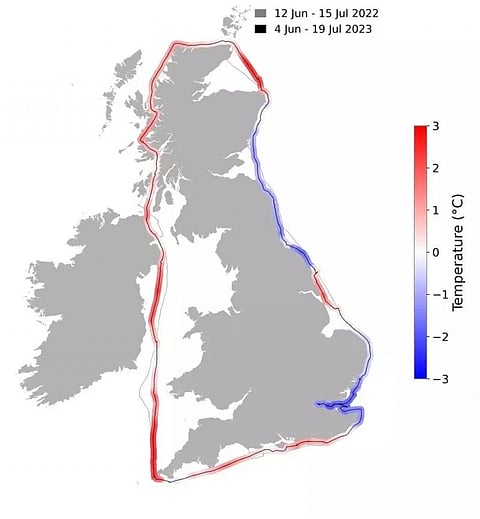

Temperature differences between 2022 and 2023 GB Row Challenges. Red indicates warming and blue cooling. Credit: University of Portsmouth
The island of Britain has always been about the sea. Its largest constituent nation, England, is famous as one is less than 70 miles from the ocean in any English locale. The sea helped Britain escape defeat at the hands of Napoleon Bonaparte and Adolf Hitler. It also helped the British become one of the greatest naval powers globally. But now, the seas around Britain are warming, a new study has found.
An all-female crew of rowers circumnavigated the island last summer and collected sea surface temperature data from the North, Celtic and Irish Seas as well as the English Channel that separate Britain from the neighbouring island of Ireland and mainland Continental Europe, the University of Portsmouth said in a statement on March 13, 2024.
UK coastal seas were on average 0.39 degrees Celsius (°C) warmer in 2023, compared to 2022, the data showed.
“Some areas experienced even more substantial warming, with local increases exceeding two degrees Celsius in the Celtic and Irish Seas, and the northern North Sea,” the statement added.
The university also pointed out that a recent study had calculated the decadal warming for the English Channel, finding a 0.35°C per decade increase in sea surface temperature, based on satellite and buoy data.
“The magnitude of this warming is highly significant ... GB Row data shows that this level of warming was achieved in just one year, when comparing summer 2022 and 2023 temperatures,” according to the university.
However, there were some notable exceptions too. These included the estuary of the Thames — the river of London — as well as the coastline of Kent to its south.
“Alongside the warming in most of Great Britain’s coastal waters, a few locations experienced a decline in sea surface temperature from 2022 to 2023, such as in the Thames Estuary both at the start and end of the monitoring, and around Kent in early June. The latter area had the most intense cooling, with surface waters in 2023 up to 1.9°C cooler than in 2022,” the statement noted.
The university, however, warned that these localised temperature changes, alongside generalised warming, will likely impact ecosystems in the long term.
The data collected by the crew includes collections of eDNA samples. This will allow for an analysis of temperature variations with biodiversity, a key factor in controlling species distribution.
The eDNA report will be released shortly.
The crew were part of the GB Row Challenge, a 2,000-mile rowing challenge around Britain’s rugged coastline, where teams brave treacherous waters to collect vital ocean data.
The data is then analysed by scientists at the University of Portsmouth.
The all-women team, Team Ithaca, rowed two hours on and two hours off for 44 days and circumnavigated the entire island.
A temperature sensor was installed on the rudder of GB Row Challenge boats by ocean technology provider, RS Aqua.
It was at a depth of 75 cm at sea and physically analysed seawater temperature every few minutes, building a ground truthed dataset spanning the entire UK coastline for 2022 and 2023.
The university statement added that two years of data was not enough to make long-term predictions. Continuous monitoring was thus essential, especially as the greatest temperature rises observed were in areas with little coverage by oceanographic buoys.
However, Fay Couceiro, professor of environmental pollution and lead scientist from the University of Portsmouth, warned that the findings were a clarion call.
“This increase in temperature, however small, has far-reaching consequences for marine life, storm strength and rising sea levels,” she was quoted as saying.